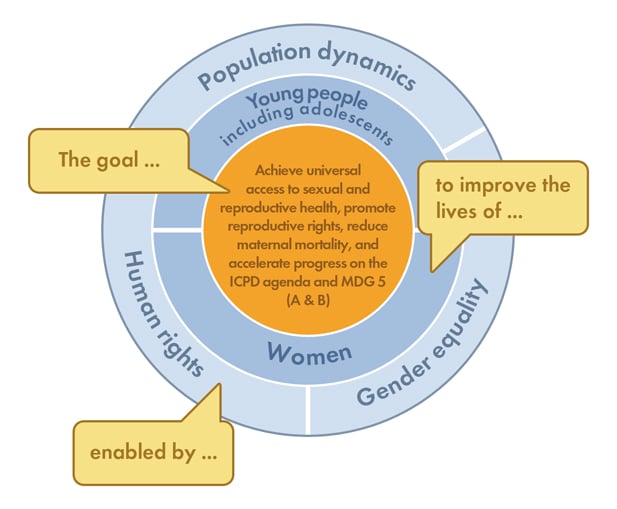أنت هنا
Topics
UNFPA's goal is to achieve universal access to sexual and reproductive health (including family planning); to promote reproductive rights, reduce maternal mortality and to accelerate progress on the ICPD Agenda and MDG 5 (A and B) in order to empower and improve the lives of young people (including adolescents) enabled by our understanding of population dynamics, human rights and gender equality driven by country needs and tailored to country context.

In a region passing through historical juncture, UNFPA Arab States Regional Office has established a programme aiming at addressing main challenges regarding youth, gender issues, and maternal health, strengthening the progress made and accelerating actions in specific areas to advance development in the Arab region.
Most of the Arab countries are reaching the peak of a “youth bulge,” the largest cohort of young people in their history. This demographic transition has important social, political and economic consequences. The immediate challenge for countries with a young population is to generate the skills and economic opportunities that bring hope of employment, security and rising living standards. Thus, for UNFPA and its partners in the region, investing in young people is a key step to turn the “youth bulge” into a demographic dividend. This offers fertile soil for the rise of youth-friendly services for sexual and reproductive health in the region. In addition, the regional office promotes the creation of platforms for young people to build their capacities and become agents of change.
Developing adequate information about population dynamics and using figures to advance the ICPD agenda remains at the heart of the work of the Arab States Regional Office.
Multiple contextual issues have directly and indirectly impacted maternal health in the Arab region. Whilst several countries maintained low levels for their maternal mortality rate (MMR), including most of the GCC countries, there is substantial variation between countries. Some have achieved significant progress in reducing maternal mortality ration, while the others have seen little or no achievements at all; and within countries, rural rates are sometimes greater than those in the main cities. As mandated by both ICPD agenda and MDG 5, the reproductive health program in the region focuses on reducing maternal mortality and increasing access to quality reproductive health services.
In terms of mainstreaming gender equality, the region’s advancement remains slow, and despite the progress made by the Arab countries in eliminating gender disparity in access to education, particularly at the primary level, differences between individual countries and sub-regions continue to exist. Activities of the Regional Office are focusing on Gender Based Violence, particularly FGM and early marriages, which are still threatening health and wellbeing in many Arab countries. In addition, the office is aligning its efforts with young men and boys as well as faith-based organizations to ensure the achievement of full rights for every young woman and girl.
As political turmoil grips the region, the Arab States Regional Office is increasing its interventions in humanitarian settings, offering reproductive health services and dignity kits for women. Interventions focus on health service provision, reproductive health care, psychosocial support and referral of survivors of gender based violence to medical services. They include also training young people through peer to peer education methods to empower them to contribute to brighter futures.
